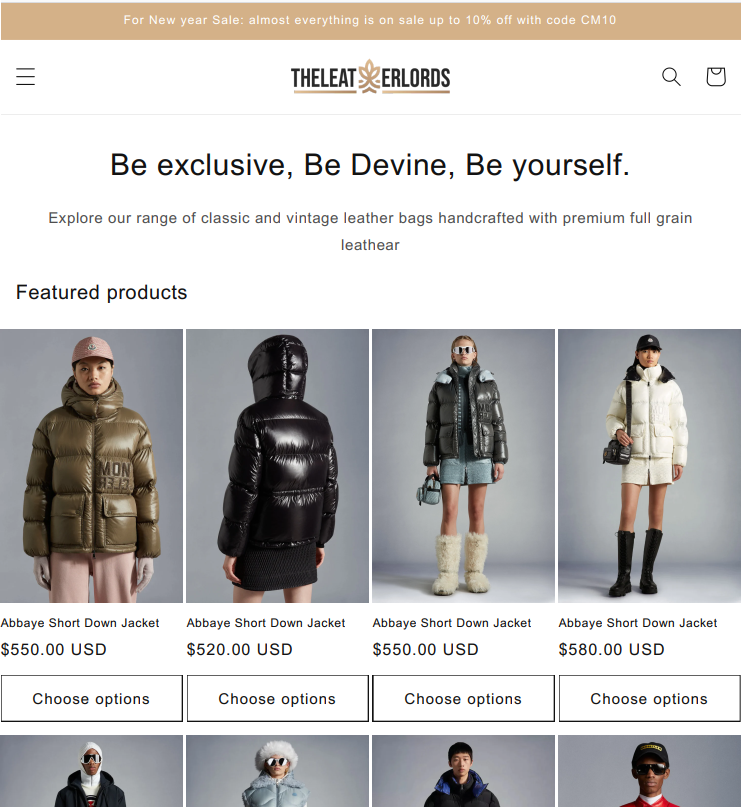
During the holiday season many online retail websites start to pop up. Many of them advertise popular and hard to obtain items, especially gaming consoles, for sale. Unfortunately many are scams.
We came across one such fraudulent retailer, The Leather Lords, that lured customers in with PlayStation 5 (PS5) consoles and the chance to buy now and pay later by using Afterpay as the payment method. In complaints submitted to Business Consumer Alliance, a consumer, Lashawnda, explains how she was conned by The Leather Lords and left on the hook to pay for PS5 consoles that she never received. Lashawnda says in November 2022 she purchased two PS5s from https://store.theleatherlords.com for approximately $1,000. The website's only payment option was to use Afterpay, a third party payment service that allows customers to make payments on purchases.

Lashawnda immediately grew suspicious after her purchase when she attempted to contact The Leather Lords by phone and found the number disconnected. Lashawnda’s antennas remained raised when she looked at Afterpay’s contact information for The Leather Lords and found it was incorrect. Lashawnda attempted to cancel the order with The Leather Lords using the only communication method available, email. The emails went unanswered.
Feeling scammed, Lashawnda immediately contacted Afterpay to report the suspected fraud. In her complaint submitted to BCA against Afterpay, Lashawnda states she has attempted to get a refund of the $249 payment that was made towards the fraudulent purchase and to have the remaining balance of $749.25 cancelled. She had difficulty getting Afterpay to address the issue on her own.
BCA was able to obtain a response from Afterpay. The company explained they would open an investigation into the fraudulent transaction and assist Lashawnda. The Leather Lords, on the other hand, are a different story. Emails to the company were undeliverable. The address provided on the company’s website, 2380 NW 2nd Avenue, Miami, FL 33127, does not appear to exist. A search of Google Maps shows no such location. The website has since been taken down.
Afterpay is an option for customers who want to make installment payments for purchases. According to Afterpay, merchants are paid in full up-front for the purchase and the customer pays Afterpay back over four installments. Problems arise when the merchant is a scammer or fraudulent business. As is evident in Lashawnda’s case, the scam retailers received full payment for the fraudulent transaction while the customer is left to pay for products that are never received or not as advertised. If you are considering using Afterpay for payment, make sure you thoroughly read the terms and conditions to know what to expect.
Customers frequently complain about the quality of Afterpay’s customer service. Specifically, customers allege Afterpay does not provide phone support and email responses are canned and automated. They experience difficulty resolving the matter directly with Afterpay. Some have turned to BCA to get a reply. Currently, Afterpay has responded to all complaints mediated by BCA.
BCA warns consumers to use caution when shopping online. Before you make your next online purchase consider the following tips:
- Only shop secure websites. You’ll know a website is secure if you see the “https://” before the URL and look for the lock icon next to the browser.
- Watch out for imposter websites. There are many online scammers posing as legitimate businesses. Make sure you are shopping on a retailer’s official website.
- Use a credit card to pay if possible. This gives an added safeguard when you purchase and makes it possible to dispute charges if items do not arrive, are not as advertised, or if some other issue arises.
- Read the fine print and policies posted on the website so you are aware of shipping, return, warranty, or refund conditions.
- Only purchase from a trustworthy source. Don’t get enticed by flashy online ads or social media posts and make purchases without checking out the business's reputation first.
- Only shop websites that post a privacy policy and take time to read it to see what information is shared and what is done to protect your personal information.
- Never provide more information than needed. You shouldn’t have to provide your social security number or date of birth to make a purchase.
- Use a strong and unique password.
- Make sure to keep a record of your purchase and routinely check your statement for unfamiliar charges.
- Beware of too good to be true offers. It’s more than likely a scam.
While the holiday season is peak time for fraudulent websites, scammers work around the clock 365 days a year. Be suspicious of new websites, especially ones that sell items that appear to be suspect. For example, at first glance The Leather Lords website home page was set up to make the business appear to be a clothing retailer. But if you look at the pages categories, there is a section for Gaming Consoles. One would wonder why a clothing retailer would be selling hard to find PS5s on their website.

Before trusting any retailer, do your research. Start by searching for the business on BCA’s website. You can also search online by using the business name and the words “complaint” or “reviews”. If you believe the company is a scam or if you experience a problem with your purchase, file a complaint with BCA.
The Federal Trade Commission's Mail Order Rule allows the seller 30 days to ship ordered products to the buyer, unless otherwise specified at the time of purchase. If the seller cannot ship within the 30 day period, they are required to notify the buyer in writing of the delay, and give the option of waiting, or having their money returned within seven days. Credit card payments must be credited within one billing cycle.
Share this information so others don’t fall prey to similar online retail scams. Follow BCA on Facebook for more scam alerts, tips, consumer topics, and more.